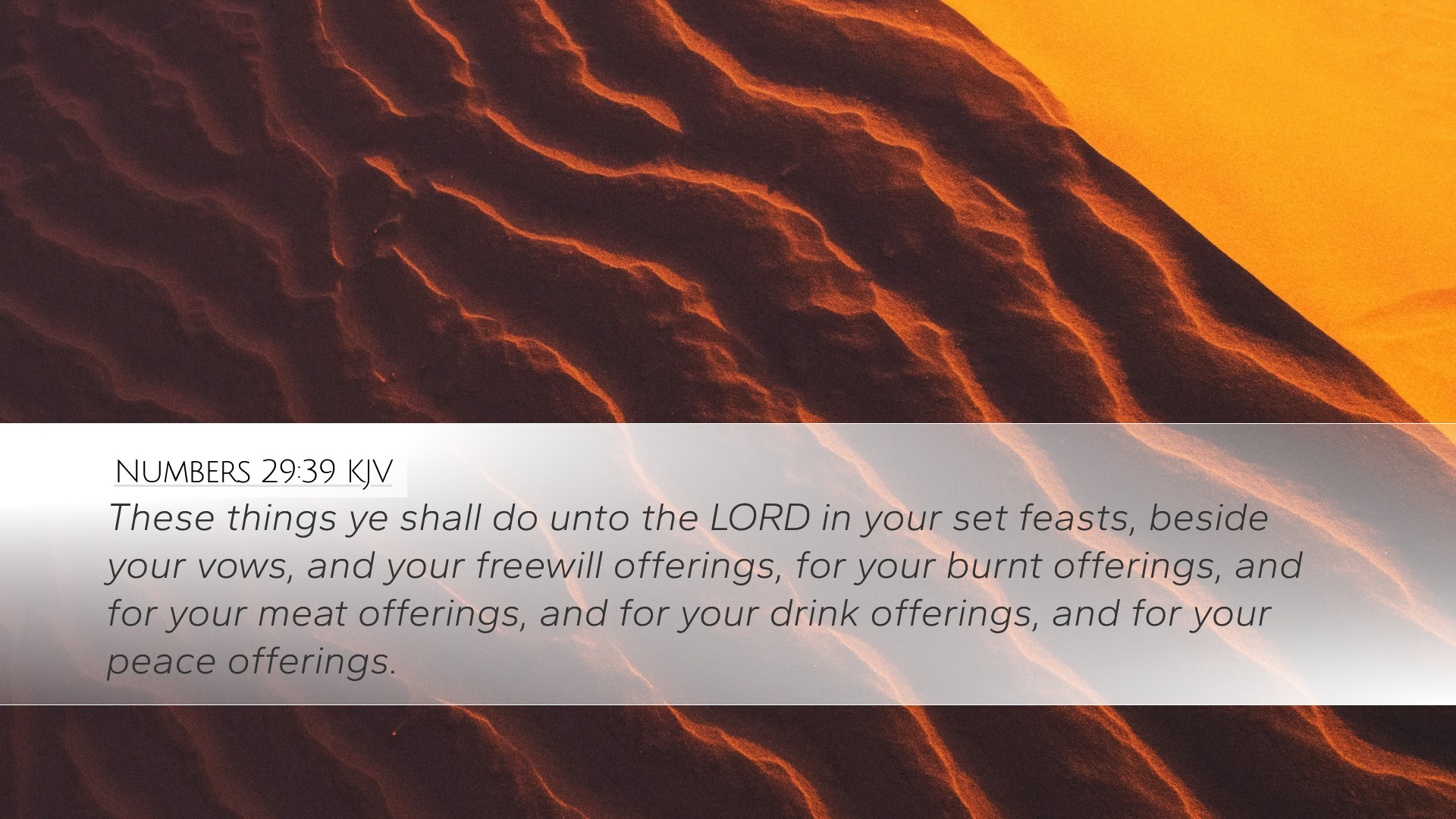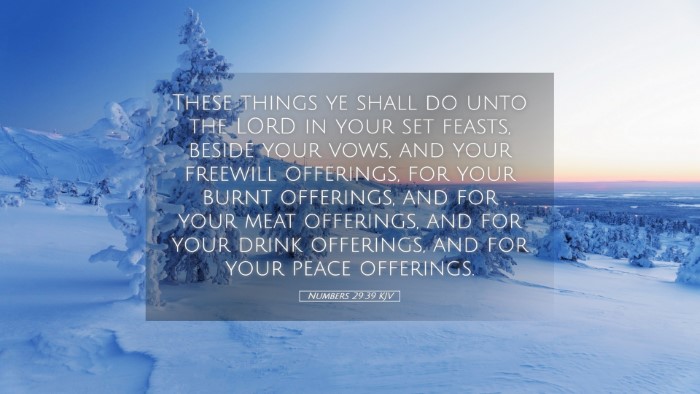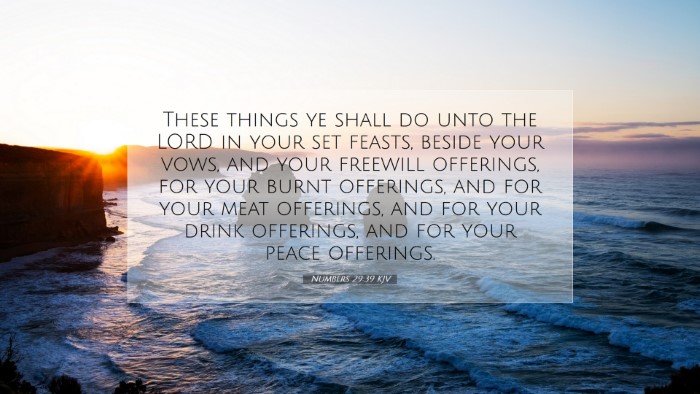Commentary on Numbers 29:39
Overview
Numbers 29:39 is part of a larger discourse regarding the offerings and obligations of the people of Israel during the sacred festivals detailed in the book of Leviticus. In this verse, the Lord specifies the final credentials for the offerings during the Feast of Tabernacles specifically, emphasizing the importance of these acts of worship as a profound aspect of Israel’s covenant relationship with their God.
Text
"These things you shall do to the Lord at your appointed feasts, besides your vows and your freewill offerings, as your burnt offerings and your grain offerings, and your drink offerings, according to their number, according to the rule for them, and their drink offerings." (Numbers 29:39)
Verse Analysis
This particular verse serves as a conclusion to the detailed regulations regarding the offerings for the various festivals. It reiterates the expectation that God's people will observe these commands meticulously. Here are some insights drawn from prominent public domain commentaries:
Matthew Henry's Commentary
Moral Obligation: Henry emphasizes the notion that the offerings to the Lord were not just a matter of ritual but are tied deeply into the community's morality and their relationship with God. He implies that the offering was an expression of their gratitude and reverence for God's provision and presence in their lives.
Feast of Tabernacles: Henry reflects on the significance of the Feast of Tabernacles as a reminder of God's deliverance during the Exodus, symbolizing both remembrance and thanksgiving. This commentary highlights that each festival had layers of meaning, instructing believers to connect their actions with the divine narrative of salvation.
Albert Barnes' Notes on the Bible
Inclusivity of Offerings: Barnes discusses the various types of offerings mentioned, underlining that the offerings required during the feasts were not merely obligatory, but were also supplemented by freewill offerings indicating an overflow of gratitude. His commentary reveals an understanding that a true worshipper is one who gives not out of obligation alone but out of love and appreciation for God’s grace.
Attention to Detail: He notes the details in the offerings (burnt, grain, and drink offerings), suggesting that God’s standards in worship require precision and dedication. Barnes infers that the meticulous nature of these offerings underscores a deeper spiritual reality: worship is both a corporate and personal expression that demands our utmost sincerity.
Adam Clarke's Commentary
Ritual and Relationship: Clarke provides insight regarding the religious significance that the specified offerings represent. He argues that the ceremonial law, which includes Numbers 29:39, reflects Israel's unique relationship with God, where each feast and its offerings serve to continually reaffirm their covenantal status.
Historical Context: Clarke goes further to identify that this verse encapsulates the historical context of the Hebrew people amidst their journey to the Promised Land. He links the offerings to an expression of identity, community, and faith, stressing that they were intended to bind the people closer to God, ensuring they neither forget His commandments nor their origins.
Theological Implications
The implications of Numbers 29:39 extend far beyond the ancient context in which it was written. Here are some theological reflections pertinent to the life of the church today:
- Covenantal Relationship: The obligations lays bare an essential truth about covenantal relationships; when God enters into a covenant, His followers must respond appropriately, not just with ritual but with heartfelt commitment.
- The Role of Worship: The emphasis on worship as expressed through offerings serves as a reminder for contemporary believers to engage in worship that encompasses all of life, extending beyond the confines of formal church gatherings.
- Inclusivity of Offerings: The distinction between obligatory and freewill offerings highlights that worship should not only fulfill requirements but also reflect exuberant love and gratitude for God’s blessings.
- Attention to Detail in Worship: Just as Israel was called to adhere to the specifications of their offerings, so too are modern believers invited to engage in worship that is thoughtful, intentional, and reflective of God’s holiness.
Practical Application
For pastors, students, and theologians, this verse challenges us to consider how we might apply the principles of worship articulated here in our contemporary practice:
- Encouraging Generosity: Emphasize the importance of both obligatory and freewill offerings in church life, creating spaces where generosity is fostered and celebrated.
- Commemorate Acts of God: Use the liturgical calendar to remind congregants of God's faithfulness, drawing connections between ancient practices and modern worship.
- Holistic Worship: Encourage worship that encompasses not just the singing of hymns and prayers, but also the offering of our lives as living sacrifices, as articulated in Romans 12:1.
- Precision in Worship: Teach about the importance of approaching God with reverence and the understanding that our devotion should be marked by seriousness and integrity.
Conclusion
Numbers 29:39 calls for both reflection and action within the community of faith. It sits within a framework of worship that demands our attention to detail, a commitment to a covenantal lifestyle, and an understanding of our identity as people set apart for God’s purposes. The insights derived from scripture and highlighted through the commentaries of Henry, Barnes, and Clarke provide a rich tapestry of understanding that can inform spiritual practice today.


